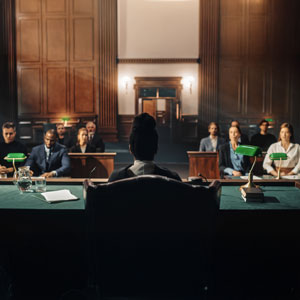
Preparing for a federal criminal trial is a comprehensive and meticulous process involving several key steps that require careful planning, thorough investigation, and a strategic decision-making process to develop the best possible defense. Here’s an overview of the general steps a defense attorney would take:
You’ll meet with the attorney and discuss the charges. Their goal should be to understand the situation from your perspective as well as to explain the legal process and the potential outcomes to you. The attorney will begin gathering facts, too.
Your attorney will continue with an initial investigation. They’ll likely obtain the discovery so as to get the indictment against you. They’ll also gather documents, identify witnesses, and begin collecting relevant evidence.
The government is typically under an obligation to provide the defense with all the materials it intends to rely on at trial. Your attorney must review all the evidence that is provided, which will include things such as
Your lawyer should conduct legal research in light of what they’re presented with, uncovering all applicable laws, precedents, and legal standards that relate to your charges.
Your attorney may file pretrial motions like a motion to suppress evidence, a motion to dismiss charges, or, in certain situations, a request for a change of venue. These motions then get argued in court and, depending on the ruling on that, can shape the scope of the trial.
In this phase, your attorney will interview potential witnesses of both the defense and the prosecution. You’ll want to prepare your witnesses for testimony to ensure they understand the process and can effectively communicate the information that they have.
Depending on the circumstances of your case, it may be necessary to consult with experts in relevant fields like forensic experts, firearms experts, medical experts, or financial experts in an effort to support your case.
Next is developing your trial strategy. This entails creating and addressing certain themes and narratives to present the case in a favorable light to the jury. Your attorney will also come up with the order of witnesses, opening statements, and begin drafting closing arguments.
You’ll likely be sitting right next to your attorney during this part of the process. Believe it or not, you can help select the jury that will hear your case at trial. Both sides’ lawyers ask questions of the members of the jury panel as part of the process of removing people from the pool and arriving at the final jury.
With the commencement of the trial, proper opening statements are made. Your attorney will deliver an outline of your case and set the stage for the evidence that they will present.
Your attorney will develop questions for cross-examination of the prosecution’s witnesses aimed at challenging their credibility and reliability. They may also prepare objections to evidentiary issues that might arise during cross-examination.
Your attorney will finally present your case, including calling your witnesses and evidence. They’ll do so ideally in both a clear and persuasive manner.
Closing arguments are summarizes of the case, and both the prosecution and defense give one. Your attorney will highlight key evidence and address weaknesses in the prosecution’s case, underscore their inability to meet the beyond a reasonable doubt standard.
At this point in the process, your attorney will work with the prosecution and the judge to agree on a set of jury instructions. These are recitations of the law that the jury is supposed to use when determining whether or not you broke the law.
Sometimes, motions for a new trial or to set aside a verdict are filed. This happens at this point in the process.
If found guilty, you’ll be sentenced. If convicted, your attorney will gather mitigating evidence and present arguments for a lenient sentence. If there were any legal errors or issues during the trial, they would file an appeal accordingly.
Reaching a verdict in federal criminal cases is a detailed and methodical process that involves careful deliberation and adherence to strict legal standards.
Once both sides have presented their closing arguments, the judge steps in to provide jury instructions. This is a comprehensive guide on how to apply the law to the evidence they’ve seen. The judge breaks down the charges, explains the elements of each offense, and emphasizes the high burden of proof required in criminal cases, beyond a reasonable doubt.
With these instructions in mind, the jury deliberates in a private room. This is where the real work begins for the jurors. They sift through the evidence, discuss the testimonies, and debate the merits of the arguments presented. The goal is to reach a unanimous decision, one way or the other.
When the jury comes to a unanimous decision, they return to the courtroom. At this point, they elect a foreperson, who essentially becomes their spokesperson. This foreperson announces the verdict for each charge, clearly stating whether the defendant is guilty or not guilty.
Not all cases are straightforward. Sometimes, the jury can’t reach a unanimous decision, leading to a hung jury. In such instances, the judge declares a mistrial. This doesn’t mean the case is over, though. The prosecution must decide whether to retry the case or drop the charges, weighing factors like the strength of the evidence and the seriousness of the offense.
Throughout this entire process, the jurors’ duty is to remain impartial and fair, ensuring that their verdict is based solely on the evidence and the law. Their deliberations are a critical component of the justice system, embodying the principle that everyone is entitled to a fair trial.
For more information on The Trial Process, an initial consultation is your next best step. Get the information and legal answers you are seeking by calling (626) 600-3437 today.